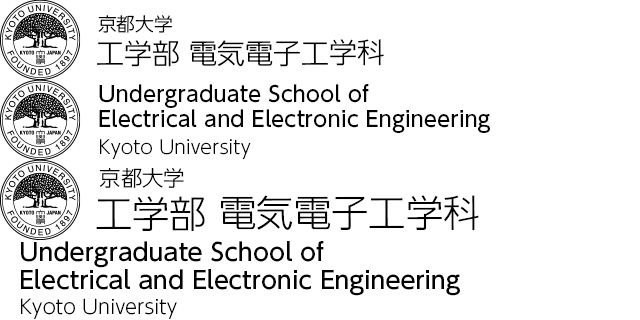Outline
Electrical and electronic engineering is a technology indispensable to the foundation of every industry and social life today. Examples are various electronic/information/communications systems that incorporate large-scale integrated circuits (LSI) and optical/semiconductor devices, and artificial intelligence and control systems that are programmed into home electronics, robots, automobiles, communications satellites, medical and welfare apparatus. In addition to technologies for securing efficient and stable electric power supply, technologies to improve the efficiency of electrical and electronic equipment and promote the harmonious coexistence between human and nature are of increasing importance.
The School of Electrical and Electronic Engineering provides a comprehensive education from basic to applied research in three broad academic fields: (1) basic science concerning electronic materials – such as semiconductors, dielectric materials, magnetic materials and superconductors – and the creation of new nanotechnology-based optical/electronic devices and their integrated technologies; (2) applied technologies in hardware and software for measurement, control, information, communications, and media networks; and (3) theory and practical skill on various elements and systems for the generation, transfer and use of electric energy. Education is provided in close cooperation with faculty staff from the Department of Electrical Engineering and the Department of Electronic Science and Engineering, both of which are from the Graduate School of Engineering, the Department of Communications and Computer Engineering and other three departments from the Graduate School of Informatics, some departments from the Graduate School of Energy Science, and related research institutes and centers.
In terms of science and technology, electrical and electronic engineering continues to develop broadly and cross-disciplinarily. A broad and comprehensive knowledge and understanding as well as sophisticated expertise and creativity are required of researchers and engineers. With this point in view, the School of Electrical and Electronic Engineering provides a curriculum that gives students a wide range of choice after studying basic core subjects. Its purpose is to foster human resources who can think about the large picture and develop creative skills by ensuring the acquisition of basic academic ability and enabling the pursuit of topics that they find of special interest.
Specifically, the first- and second-year undergraduate programs include the basics of electric/electronic circuits, electromagnetism, information & communications and computer engineering, programming technology, material physics, and electronic materials/devices, in addition to basic core subjects such as mathematics and physics. Moreover, the acquisition of basic academic ability is ensured through elementary experiments based on electrical and electronic engineering. In the junior year, students conduct more advanced experiments and choose the subjects they desire. At senior level, students conduct special research, in addition to elective subjects, to enhance their comprehensive specialized knowledge and understanding. Through four-year programs, students also take liberal arts subjects, such as foreign languages and cultural/social science, to acquire profound and extensive knowledge and thinking.
The School of Electrical and Electronic Engineering strongly encourages applications for admission from those who have broad interests and an inquiring mind with regard to natural phenomena, science and technology and its relations with people's lives; those who show a keen interest in an academic field related to electrical and electronic engineering; and those who are rich in creativity and exhibit basic academic abilities and the ability to think logically, which are all necessary for professional education.
A large number of students in this school continue on to graduate school. They can choose between the Graduate School of Engineering, the Graduate School of Energy Science, and the Graduate School of Informatics. There is a growing demand for those graduating in the School of Electrical and Electronic Engineering and related graduate school, who are expected to become a leading researchers and engineers in various fields that support an energy-oriented/information society.
